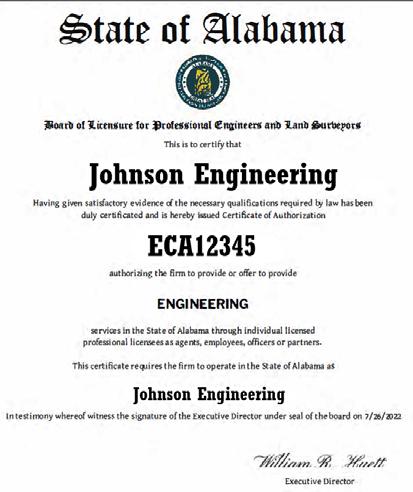
2 minute read
THE DIRECTOR’S DESK
The Board Investigators have recently been involved with several cases of companies performing or advertising engineering services without obtaining a Certificate of Authorization (CA). This is possibly due to some confusion as to when a CA is needed. We wanted to help clear up that confusion for you.
Alabama Law states “A firm that practices or offers to practice engineering or land surveying is required to obtain a certificate of authorization from the board in accordance with rules adopted by the board.” (Section 34-11-9 (a) (1). Corporate and Partnership Practice.)
Advertisement
Whenever a business or individual wishes to offer engineering or surveying services under a fictitious name in Alabama a certificate of authorization is required. A fictitious name is considered anything that is not the person’s name. For example, John H. Doe, PLS is considered a person’s name and title, while John H. Doe Surveying would require a certificate of authorization. The word “surveying” not being part of the person’s name.
Firms operating in multiple states face the task of insuring they comply with the requirements of each state. While one state may allow the use of fictitious names based on the method of how the firm is formed, others may not. In Alabama, corporations, limited liability companies (LLCs), and limited liability partnerships (LLPs) are required to register with the office of the Secretary of State and reserve a name. If the name of the firm has been issued to another firm that already exists in the state, the new firm must register with doing business as (dba) firm name.
When issued a certificate of authorization the firm must use the name on the certificate of authorization if it chooses to place the name of the firm on documents. The firm should not alter its name by abbreviation, or otherwise simply to make the name fit in a specific area of the document.
Kevin Ashley (PE) Case #2021-13
The investigation determined Ashley provided engineering services for 6 engineered septic projects. The Alabama Department of Public Health (ADPH) advised all 6 projects had significant issues that Mr. Ashley had not been addressing per their requirements. The projects were submitted to a Board Technical Advisor, and he found multiple projects that contained errors and mistakes in his standard of care for the engineered projects. The Technical Advisor also noticed a communications problem between ADPH and the engineer. The Technical Advisor stated that the engineer has to comply with ADPH requirements and needs to work with them to solve these projects problems.
Mr. Ashley agreed to a consent order that required the following:
He must pay a $2,000 fine to the Board.
His license is suspended for 2 years with the suspension stayed.
He must attend two Board approved educational courses regarding the installation of septic systems and the guidelines required by the ADPH.
The Consent Order and Final Order will be a public record.



